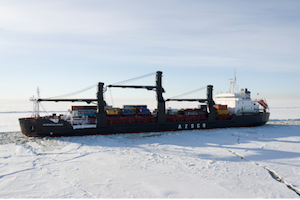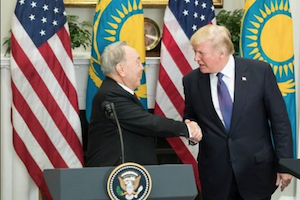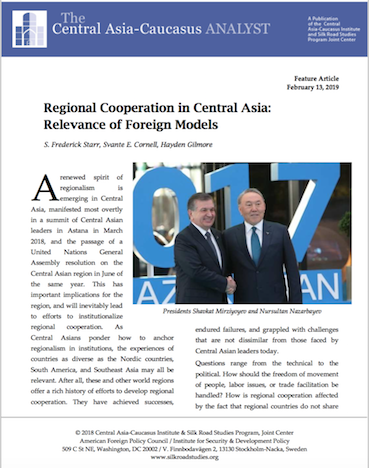Regional Cooperation in Central Asia: Relevance of Foreign Models
Regional Cooperation in Central Asia: Relevance of Foreign Models
A renewed spirit of regionalism is emerging in Central Asia, manifested most overtly in a summit of Central Asian leaders in Astana in March 2018, and the passage of a United Nations General Assembly resolution on the Central Asian region in June of the same year. This has important implications for the region, and will inevitably lead to efforts to institutionalize regional cooperation. As Central Asians ponder how to anchor regionalism in institutions, the experiences of countries as diverse as the Nordic countries, South America, and Southeast Asia may all be relevant. After all, these and other world regions offer a rich history of efforts to develop regional cooperation. They have achieved successes, endured failures, and grappled with challenges that are not dissimilar from those faced by Central Asian leaders today.
Questions range from the technical to the political. How should the freedom of movement of people, labor issues, or trade facilitation be handled? How is regional cooperation affected by the fact that regional countries do not share the same patterns of membership in international organizations? How deeply institutionalized should regional structures be? How do they relate to outside powers, particularly large ones and potential hegemons? These questions are the focus of the following sections.
Kazakhstan as an Arctic State and a Maritime Power
By Tristan Kenderdine
January 23, 2019, the CACI Analyst
The Ob’-Irtysh is the sixth largest river in the world by drainage area and sixth longest in the world at 5,410 kilometers. It is a broad and deep river, easily navigable by river barge, and also by sea-going vessels deep into the Eurasian continent. Geographically, this river system connects Kazakhstan to the Arctic Ocean, and if sufficient river maritime infrastructure were present then Kazakhstan could avoid the endogenous trade tariff that comes with being landlocked. This has massive implications for Kazakhstan’s potential trade, industry, and wider economic development.

Building the Great Financial Silk Road: Hub by Hub
By Rafis Abazov
October 16, 2018, the CACI Analyst
During the Astana Financial Days event in July 2018, President Nursultan Nazarbayev of Kazakhstan announced and personally endorsed the opening of the Astana International Financial Center (AIFC). He envisions that the AIFC will provide financial services “not only for Kazakhstan, but also for the whole world.” If successful, the AIFC can contribute to diversifying the financial resources for Kazakhstan’s national and international projects. Through its proper implementation, the government of Kazakhstan can develop a tool for improving collaboration with neighboring countries in Central Asia in the industrial, agricultural and tourism sectors, making the Central Asian section of the Silk Road more attractive for business and financial deals. In addition, the Center can become a real financial hub not only for Kazakhstan and Central Asia but also for the wider Eurasia region if it is capable of attracting enough financial resources from large international players.

The Perspective of Trans-Caspian Gas Flow to Europe
By Ilgar Gurbanov
October 25, 2018, the CACI Analyst
On August 12, Azerbaijan, Kazakhstan, Russia, Iran, and Turkmenistan signed the Convention on the Caspian Sea’s Legal Status in Astana. The Convention’s provision endorsing the construction of a subsea pipeline raised optimism regarding the Trans-Caspian Gas Pipeline (TCGP) project, which has been stalled due to the Caspian’s uncertain status. Discussions on the TCGP have been ongoing since the 1990s, envisaging the export of 30 billion cubic meters/year (bcm/y) of Turkmen gas to Europe across the Caspian by integrating with the Southern Gas Corridor (SGC).

U.S.-Kazakhstan Transit Agreement Faces Challenges From Russia
By Nurlan Aliyev
September 20, 2018, the CACI Analyst
During the Collective Security Treaty Organization (CSTO) foreign ministers’ meeting in Almaty on June 11, 2018, Russia’s Foreign Minister Sergey Lavrov informed his Kazakh counterpart of Moscow’s concerns over U.S. military logistics planning involving Kazakhstan, and biological laboratories in the country. The protest was prompted by President Nursultan Nazarbayev’s signature on May 5 of amendments to the 2010 U.S.-Kazakhstan agreement on commercial rail transit of special cargo to Afghanistan through Kazakhstan, which allow the U.S. to use Kazakhstan’s territory for supplying U.S. forces in Afghanistan. The exchange took place on the eve of the fifth Caspian summit, where the heads of the five littoral states signed a convention on the status of the Caspian Sea, according to which non-littoral states may not deploy armed forces to the Sea.





